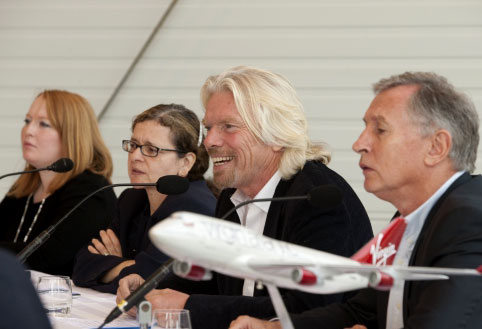
Richard Branson, with LanzaTech’s Jennifer Holmgren, talking about jet fuel made from waste carbon gases
The blog does not usually reports as much on biofuels but it has been awhile since we last posted about activities from LanzaTech. The company recently announced that it has produced the world’s first jet fuel (around 1,500 gallons) based on LanzaTech’s CO-to-ethanol fermentation process. The jet fuel reportedly passed all initial performance tests with flying colors. The jet fuel is developed through the partnership between LanzaTech and Virgin Atlantic, which started in 2011.
The “Lanzanol” ethanol was produced in China at the RSB (Roundtable of Sustainable Biomaterials) certified Shougang demonstration facility. The alcohol-to-jet (AtJ) process was developed in collaboration with Pacific Northwest National Lab (PNNL) with support from the US Department of Energy (DOE) and with the help of funding from HSBC.
LanzaTech and Virgin Atlantic are now set to continue to work with Boeing and a host of industry colleagues to complete the additional testing aircraft and engine manufacturers require before approving the fuel for first use in a commercial aircraft. Assuming all initial approvals are achieved, the LanzaTech jet fuel could be used in a first of its kind proving flight in 2017.
Following a successful ‘proving flight’ the data collected will enable the partnership to seek approval to use the fuel on routine commercial flights. This would also help pave the way for LanzaTech to fund and build their first commercial jet fuel plant to supply fuel to Virgin Atlantic and other airlines. As a UK based partnership it is hoped the first LanzaTech jet fuel plant would be based in the UK.
Around 1.7 billion metric tonnes of steel is produced every year worldwide, according to the company, and waste gases are produced through the chemistry of steel making. LanzaTech estimates that its process could be retrofitted to 65% of the world’s steel mills. This offers the potential to produce 30 billion gallons of ethanol worldwide, for around 15 billion gallons of jet fuel per year representing just under 19% of all aviation fuel currently used worldwide per year (80 billion gallon total world aviation fuel use).
The LanzaTech production process explained:
- Steel production produces waste carbon monoxide (CO) gas, which is frequently flared (burnt off) to the atmosphere as greenhouse gas CO2 (or sometimes used less efficiently for other purposes).
- The LanzaTech process involves capturing carbon from the waste gas via fermentation to ethanol, which is recovered to produce ethanol feedstock for a variety of products, including aviation fuel.
- Each gallon of ethanol is converted to produce 1/2 gallon of aviation fuel.
- The process could be used to capture and recycle around 1/3 of the carbon that steel facilities would otherwise release into the atmosphere.
Here is the question for the chemical industry: down the road, will the sustainability and economics of this process be enough to start looking at ethylene downstream derivatives – e.g. ethylene for PE, EO/MEG/PET, alpha olefins, etc?
FOLLOW ME ON THESE SPACE
Discussion
Comments are closed.